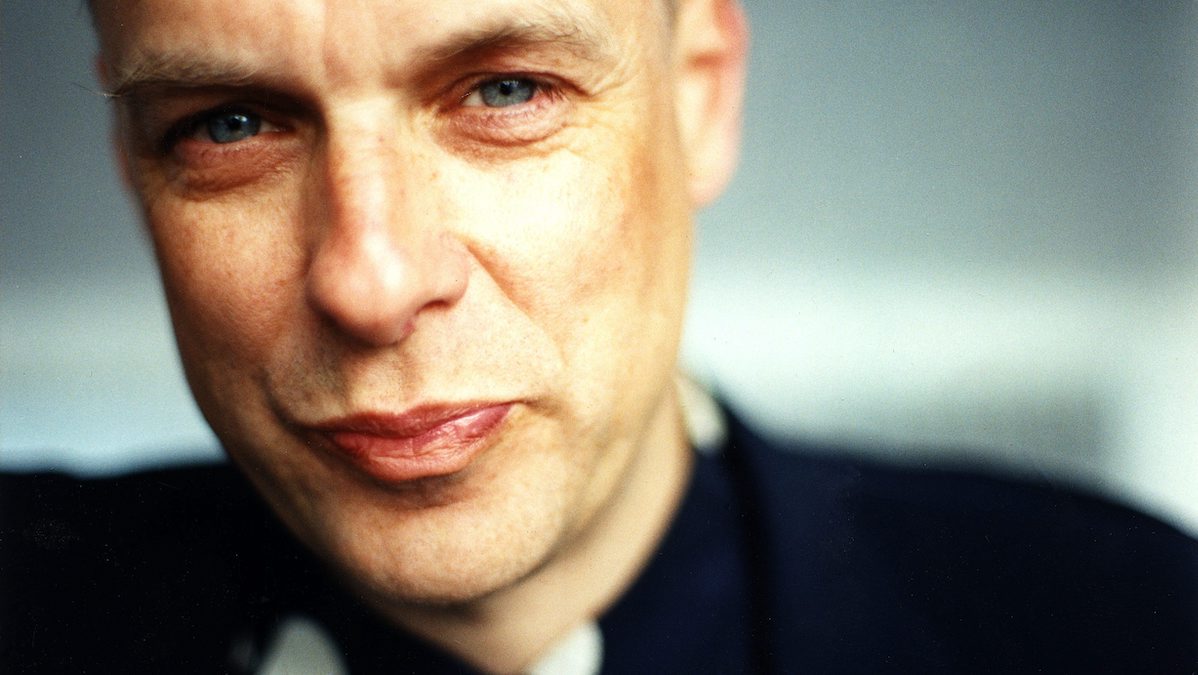"Nothing much happens for the first eight or ten hours. Just trust that it's going to work out”: Classic Brian Eno interview reveals how he really produced ambient music
And on the DX7: "I'm very surprised that Yamaha haven't given me one free"

Brian Eno doesn’t do many interviews, but when he does, you can bet your life he’s going to say something interesting. We’ve been digging around some early examples and have found one from way back in 1985 where he actually revealed – we think – how he made a piece of ambient music. And it’s very specific.
And he also said quite a bit about his love of the Yamaha DX7 synth: “I'm very surprised that Yamaha haven't given me one for free.”
Uber producer Brian Eno has been an innovative figure in music production for 50 years. He’s collaborated with the greats including David Bowie (above) and U2 for this beauty.
He's released critically acclaimed solo albums, and produced everyone from James to Devo to Talking Heads to Coldplay.
Eno also developed the Oblique Strategies concept for decision making (often used in the studio), developed generative music apps like Reflection, and even once released his own ‘transfixing’ LED turntable. Of course he did.
When I was doing albums of songs, nobody had the slightest bit of interest in them
But it’s the ambient music and his Yamaha DX7 synth expertise that gets us excited, so imagine our delight when we stumbled across an ancient Eno interview where he revealed how he actually created a piece of ambient music and why he became obsessed with the DX7.
The interview with journalist Phil South (writing as Alan Jensen) was in the classic music technology magazine Electronics & Music Maker and covered all sorts of areas. It had Eno getting annoyed that people didn’t appreciate ambient music projects like his then new album Thursday Afternoon. And nor did they ever appreciate his more traditional works – “when I was doing albums of songs, nobody had the slightest bit of interest in them”.
Want all the hottest music and gear news, reviews, deals, features and more, direct to your inbox? Sign up here.
And then there's the ambient music, like this glorious example.
We’ve never really heard Eno describe how he puts together an ambient track but Jensen, bless him, wasn’t backwards in coming forwards, asking Eno: What mechanical processes do you go through, working on a piece of ambient music?
Eno replied: "I pick a note on the piano. I play it, or get someone else to play it, for several minutes. Sometimes it's more like several hours, piddling around with the sound until I make it sound like a drop of water falling into a pool, for example. Having done that, I then record myself, or an accomplice, playing that note every... 23 seconds, or thereabouts.”
Sometimes it's more like several hours, piddling around with the sound until I make it sound like a drop of water falling into a pool
Brian Eno
That is quite a specific timing. It gets better…
"Then I do the same for another note, repeat the process, only this time playing it every 21½ seconds, perhaps. Then I'll get another note played every 17 seconds, until I begin to build up a tracery of notes which cluster together in interesting ways.”
Ok we get it… we think. But then Eno concludes.
“Nothing much happens for the first eight or ten hours, doing something like that. You have to suspend your need for gratification for a while and just trust that it's going to work out.”
Which makes us think he might be playing a bit of a game with the interviewer (as we did read that Eno hates being interviewed and once insisted on only supplying answers to random questions – those Oblique Strategies again – although we might have just made that up in a very Eno-esque way ourselves).

Onto the DX7, and bear in mind that this was late ’85 so the Yamaha synth had been around for a couple of years and had sold big numbers, with Eno having to buy one himself.
“At the moment my favourite synthesiser is a Yamaha DX7. It's funny; it's the single most popular contemporary synthesiser. Everybody has one. But nobody knows how to program them. They arrive with these factory-set sounds and that's all most people use. They never change those sounds."
Everybody has a DX7. But nobody knows how to program them.
Brian Eno
"It's a very good synthesiser, I think. In fact, I'm very surprised that Yamaha haven't given me one free. I didn't own one for a long time, but I bought one. I finally gave in. I can't wait for Yamaha. I'll put in a good word for you, Yamaha, even though you wouldn't give me a synthesiser! I know I'm not a big seller..."
Finally, Eno revealed his favourite instruments – grand piano and bass guitar – and when asked about whether he liked modern pop music said 'yes' and had this to say about The Smiths.
"I think they're a good band. I think Morrissey is an extraordinarily arrogant person, especially considering that he's probably the most successful tone-deaf singer the world has ever known. But that being said, I like his singing quite a lot, and I like their records. I could live without some of his studied miserableness, I suppose. But I don't listen to records much."
Oh, and we're not sure if Yamaha ever did give him a DX7.


Andy has been writing about music production and technology for 30 years having started out on Music Technology magazine back in 1992. He has edited the magazines Future Music, Keyboard Review, MusicTech and Computer Music, which he helped launch back in 1998. He owns way too many synthesizers.
